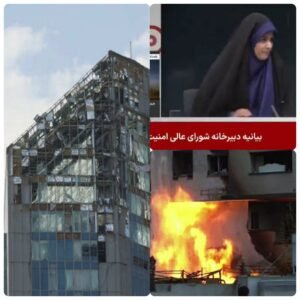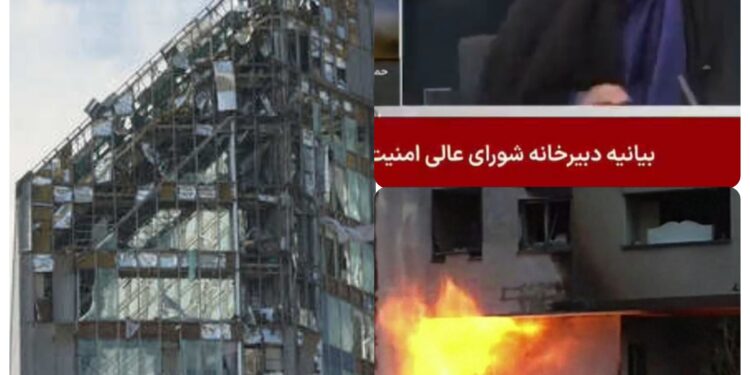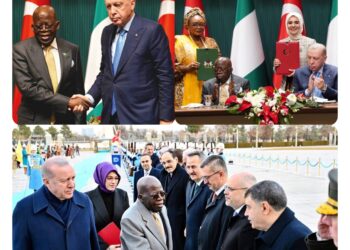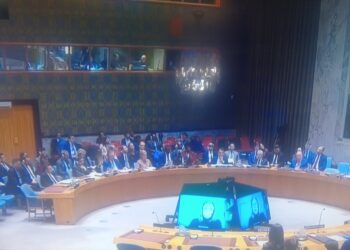
Tehran, Iran – June 16, 2025
In a dramatic escalation of hostilities between Israel and Iran, Israeli airstrikes struck the headquarters of the Islamic Republic of Iran Broadcasting (IRIB) in Tehran on Sunday night, temporarily knocking the state-run television network off the air during a live broadcast. The incident has intensified fears of a broader regional conflict spiraling out of control.
The Merit Newspaper reports that the video footage from the interrupted broadcast shows a news anchor abruptly stopping mid-sentence as loud explosions rang out, followed by a dust-filled studio and momentary screen blackout. IRIB resumed transmission from an alternate location minutes later.
The airstrike is part of “Operation Rising Lion,” a multi-pronged Israeli campaign launched late last week targeting Iranian nuclear facilities, missile infrastructure, and strategic communication nodes in response to what Tel Aviv called “imminent threats to Israeli security.”
READ ALSO:You Studied Animals, Not Journalism – Wike’s Aide Slams Rufai
Strategic Media Targeting
Israel’s Defense Forces (IDF) claimed responsibility for the targeted strike, stating the IRIB building was “not merely a broadcaster but a strategic arm of Iranian state propaganda and military coordination.” Israeli military spokesperson Rear Admiral Daniel Hagari said, “We are not at war with the Iranian people, but with the regime’s machinery that fuels terror across the region — and that includes their state-run media.”
The IRIB, long seen as a mouthpiece for the Islamic Republic, broadcasts both news and ideological content aligned with Iran’s clerical leadership. It has faced previous cyberattacks, but this is the first time the network has been physically targeted during a broadcast.
Growing Cross-Border Hostilities
The strike comes amid rising tensions and tit-for-tat attacks. On June 13, Iran launched missile and drone strikes into Israeli territory, reportedly in retaliation for a suspected Israeli operation that destroyed parts of Iran’s Natanz nuclear facility. Israel responded swiftly with coordinated airstrikes on multiple Iranian targets across Tehran, Isfahan, and Mashhad, including military barracks and satellite command centers.
Both nations have exchanged threats of “massive retaliation,” raising alarm within the international community.
Iran’s Foreign Ministry condemned the bombing of IRIB, calling it “a direct attack on Iranian sovereignty and freedom of expression.” Iran’s Supreme Leader, Ayatollah Ali Khamenei, described the move as “a war crime that will not go unanswered.”
Civilian Displacement and Casualties
Local reports say over 40 civilians have been killed and hundreds injured in the last 72 hours across Iran and Israel. Tehran’s hospitals are overwhelmed with victims from collapsed buildings and shrapnel injuries. Meanwhile, air raid sirens continue to sound across Israeli cities, including Tel Aviv and Haifa.
In a televised address, Israeli Prime Minister Benjamin Netanyahu said, “This is a war for survival. We will dismantle Iran’s offensive capabilities piece by piece — including its channels of misinformation.”
Global Reactions and Calls for De-escalation
The United Nations Security Council held an emergency session on Monday, with Secretary-General António Guterres urging both sides to “pull back from the brink” and emphasizing the grave humanitarian consequences of further escalation.
U.S. Secretary of State Antony Blinken condemned Iran’s earlier missile strikes but also expressed concern over Israel’s expanded targeting strategy. “Media institutions, even state-run ones, are not legitimate military targets under international law unless actively involved in combat,” Blinken said.
Russia and China, both of whom maintain diplomatic ties with Tehran, called Israel’s actions “provocative” and requested immediate ceasefire negotiations.
A Regional War in the Making?
Experts fear the latest developments could trigger a larger Middle East war, involving regional proxies like Hezbollah in Lebanon and Houthi rebels in Yemen, both backed by Iran. Already, Hezbollah has fired rockets into northern Israel, and Israeli jets have struck supply lines near the Syrian border.
“The attack on Iran’s state TV isn’t just symbolic; it signals a shift in Israel’s military doctrine — to include psychological and communication warfare,” said Dr. Hanan Azoulay, a Middle East security analyst at Tel Aviv University.
READ ALSO:Tinubu Approves ₦2bn, 20 Rice Trucks for Mokwa Flood Victims
As the skies over Tehran and Tel Aviv remain on high alert, and civilians scramble for safety, the world watches anxiously. Whether diplomacy will prevail or further devastation awaits may depend on the next 48 hours — a fragile window in an increasingly combustible standoff.

















